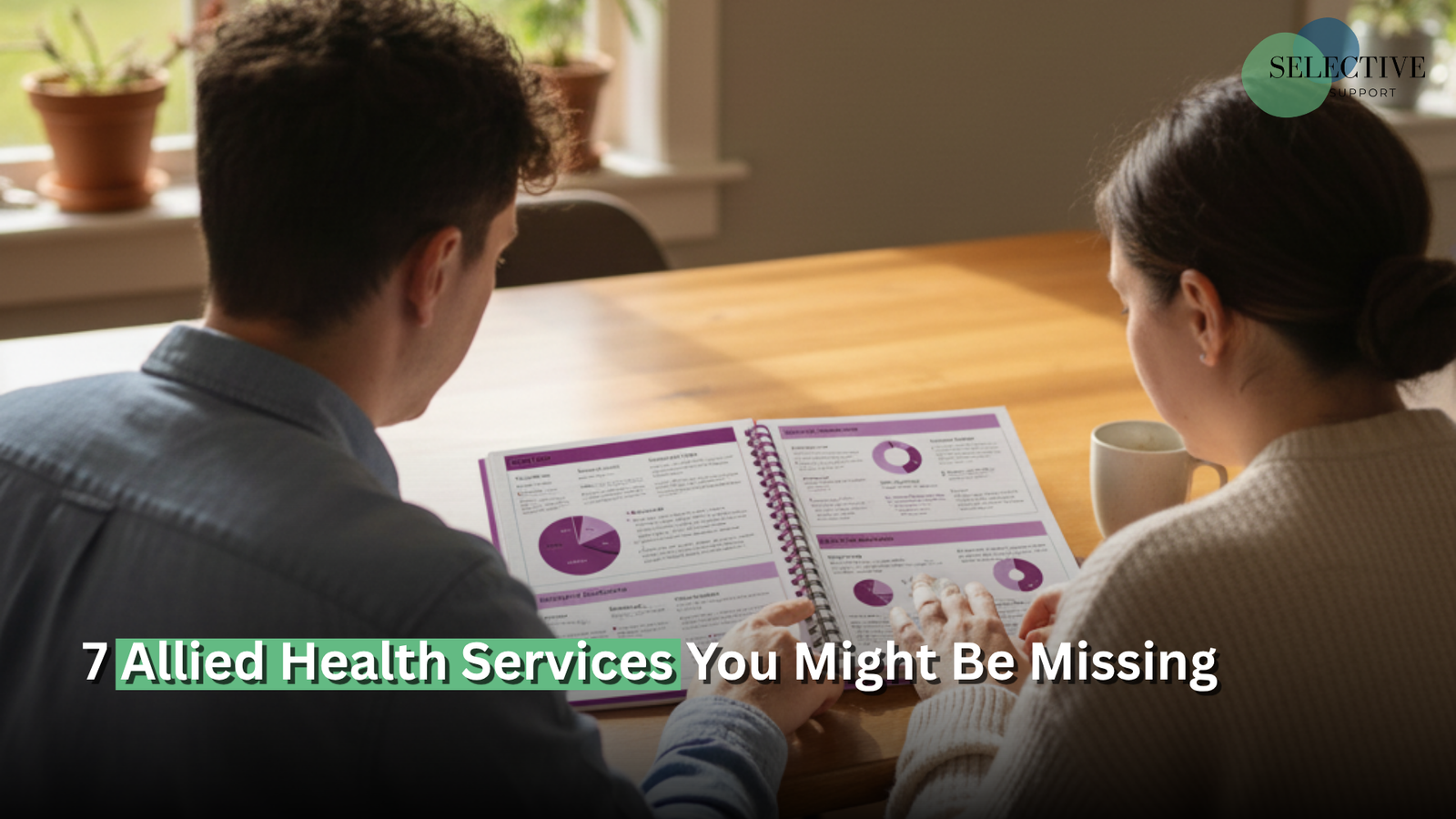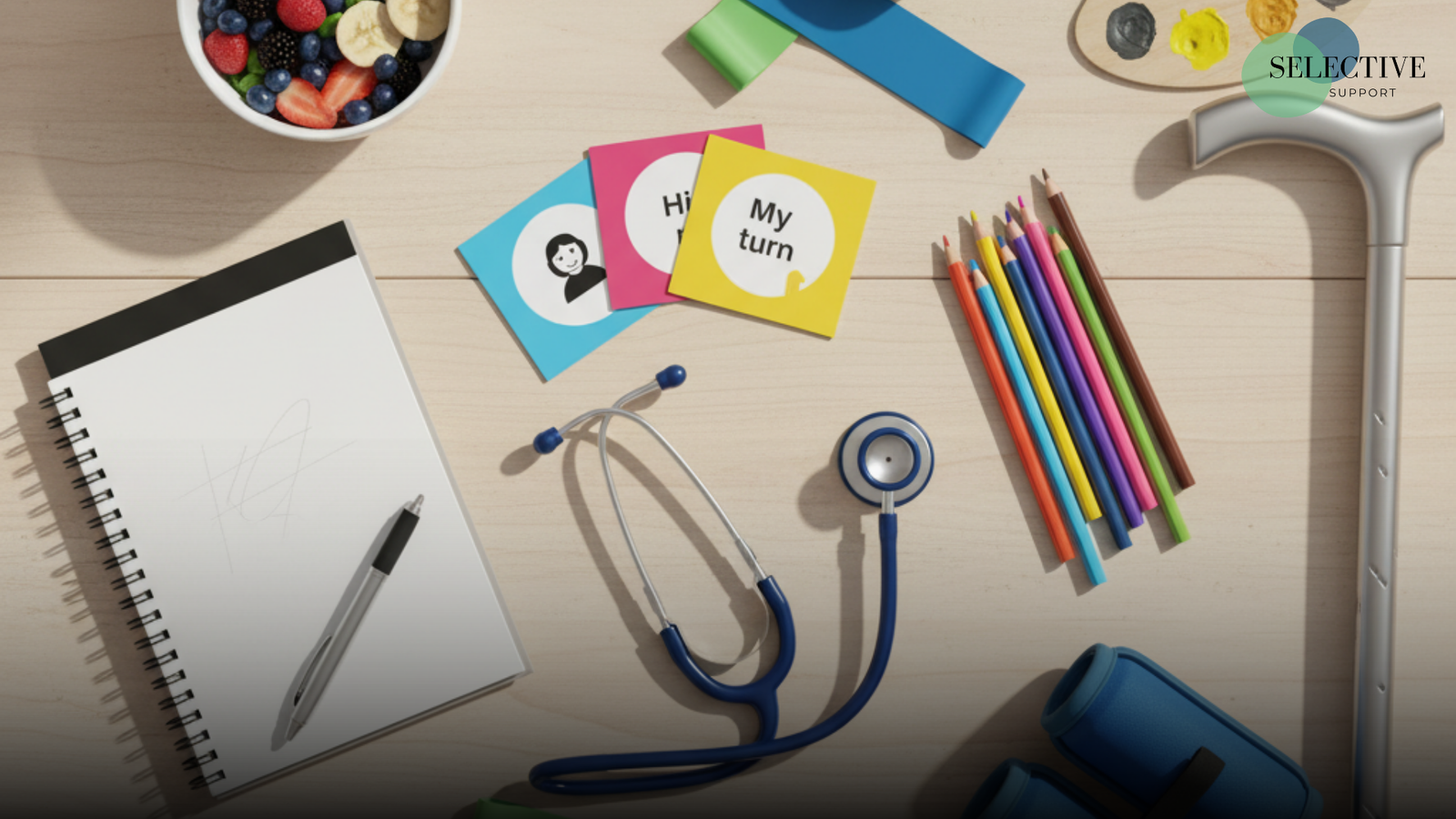Allied Health NDIS: 7 Services You Might Not Know You Have
Have you ever looked at your NDIS plan and thought, “What does allied health even mean for me?” Many participants feel unsure about what services are included under Allied Health NDIS, or how these supports can actually help in everyday life.
At Selective Support, we meet people all the time who don’t realise they’re missing out on valuable services, ones that could help them feel more independent, supported, and confident. This blog is here to make it clearer for you. We’ll walk through seven allied health services you might already have access to (or could request) and explain how they can support your goals.
What Is Allied Health in the NDIS?
Allied health under the NDIS refers to a group of healthcare services that support your physical, mental, and emotional wellbeing. These services are often listed under Capacity Building or Core Supports in your plan.
Between 2013 and 2022, the number of registered allied health professionals in Australia grew by 67 %, the highest growth rate among health professions. Rather than focusing on just one part of your health, allied health takes a whole-person approach. These professionals don’t replace doctors or nurses, they work alongside them to help you live more independently and build the skills you need in daily life.
Meet Your NDIS Allied Health Professionals
Not sure who qualifies as an allied health professional? Here are some of the common ones under the NDIS allied health professionals category:
- Occupational Therapists (OTs): Help you with daily activities, building routines, and using equipment.
- Physiotherapists: Support your movement, balance, and pain management.
- Speech Pathologists: Work on communication, social interaction, and even swallowing.
- Psychologists and Counsellors: Support mental health and emotional resilience.
- Dieteticians: Help with healthy eating and managing conditions through nutrition.
- Exercise Physiologists: Create fitness plans tailored to your needs.
If that list feels overwhelming, don’t worry. You’re not expected to figure it out alone. Our team at Selective Support can help you understand what’s in your plan and who might be the best fit for your goals.
Need help choosing the right therapist? Talk to one of our coordinators, we’ll guide you through it.
The Allied Health Services List: What Might Be in Your Plan
The allied health services list can vary from person to person, depending on your needs and plan goals. But here are 7 services that are commonly available, and often underused:
1. Occupational Therapy
Helps you build confidence and independence in daily tasks like cooking, cleaning, or getting ready for the day. Great for those struggling with routine or energy.
2. Physiotherapy
Improves your physical strength and mobility. Ideal if you’re dealing with pain, recovering from injury, or want to move more freely.
3. Speech Therapy
It’s not just about speaking, speech pathologists also help with swallowing, understanding others, and using communication devices.
4. Psychology or Counselling
Supports emotional wellbeing, especially if you’re living with anxiety, depression, or trauma. These professionals help you build tools to manage day-to-day stress.
5. Dietetics
Helps you plan balanced meals and manage chronic health issues through better nutrition. Especially helpful for people on restricted diets.
6. Art or Music Therapy
Supports self-expression and emotional healing, especially for those who find talking difficult. This can be calming and confidence-building.
7. Exercise Physiology
Gives you a safe, tailored plan to get stronger, improve stamina, or manage a chronic condition.
One of our clients, Caleb, used to feel stuck in his routine. With regular OT sessions and gentle encouragement, he’s now cooking simple meals and taking walks in his local park.
Wondering if these supports are already in your plan? Book a free call with Selective Support and let’s find out together.
How Allied Health Therapy Services Help You Reach Your Goals
Allied health isn’t just about appointments, it’s about building a life that feels good to live.
These allied health therapy services can:
- Reduce stress by giving you tools to cope
- Help you build and stick to a daily routine
- Improve physical strength and reduce pain
- Support communication, connection, and social interaction
- Boost confidence by achieving small wins over time
For example, a participant we supported started therapy feeling overwhelmed and disconnected. With weekly psychology and art therapy sessions, she found new ways to express herself and now looks forward to community group activities.
Interested in therapy that fits your personality and goals? Let us help connect you with someone who truly gets it.
Are You Using These Services in the Best Way?
You might already have access to these services in your NDIS plan, but not realise how to use them.
Here’s how to check:
- Look at the “Capacity Building” section of your plan
- Talk to your Support Coordinator about gaps or underused funding
- Ask your Local Area Coordinator (LAC) or planner if something can be added
- Request a plan review if your goals have changed
In many states and territories, participants currently use less than 60 % of their allocated therapy (allied health) support budgets.
At Selective Support, we often hear things like, “I didn’t know I could use my plan for that.” And that’s exactly where we can help.
Let’s make sure nothing in your plan goes to waste. Our coordinators take the time to explain it all, in plain English, and at your pace.
You Don’t Have to Figure It Out Alone
Navigating the NDIS can feel confusing, especially when it comes to allied health. But the right support doesn’t just help you survive, it helps you thrive.
We’ve walked through the seven most common allied health services that might be hiding in plain sight within your plan. From building a routine to improving your emotional wellbeing, these supports are here to help you live the life you want.
Still unsure what services are in your plan or how to get started with them? Let Selective Support walk alongside you. Reach out today and let’s take the next step, together.
Frequently Asked Questions About Allied Health and the NDIS
1. Can I choose my own allied health provider under the NDIS?
Yes, you can. If your plan is self-managed or plan-managed, you have the freedom to choose your preferred NDIS allied health professionals, whether they’re registered with the NDIS or not. If your plan is NDIA-managed, you’ll need to select from NDIS-registered providers.
2. Do I need a referral to access allied health services under my NDIS plan?
No referral is needed for most allied health supports funded by the NDIS. However, your Support Coordinator can help you find the right provider and check that it aligns with your plan goals and budget.
3. How do I know if I have funding for allied health in my NDIS plan?
Look under the Capacity Building or Core Supports section of your NDIS plan. These categories often cover allied health therapy services like OT, physio, or psychology. If you’re unsure, a Support Coordinator (like those at Selective Support) can help you review and understand your funding.



